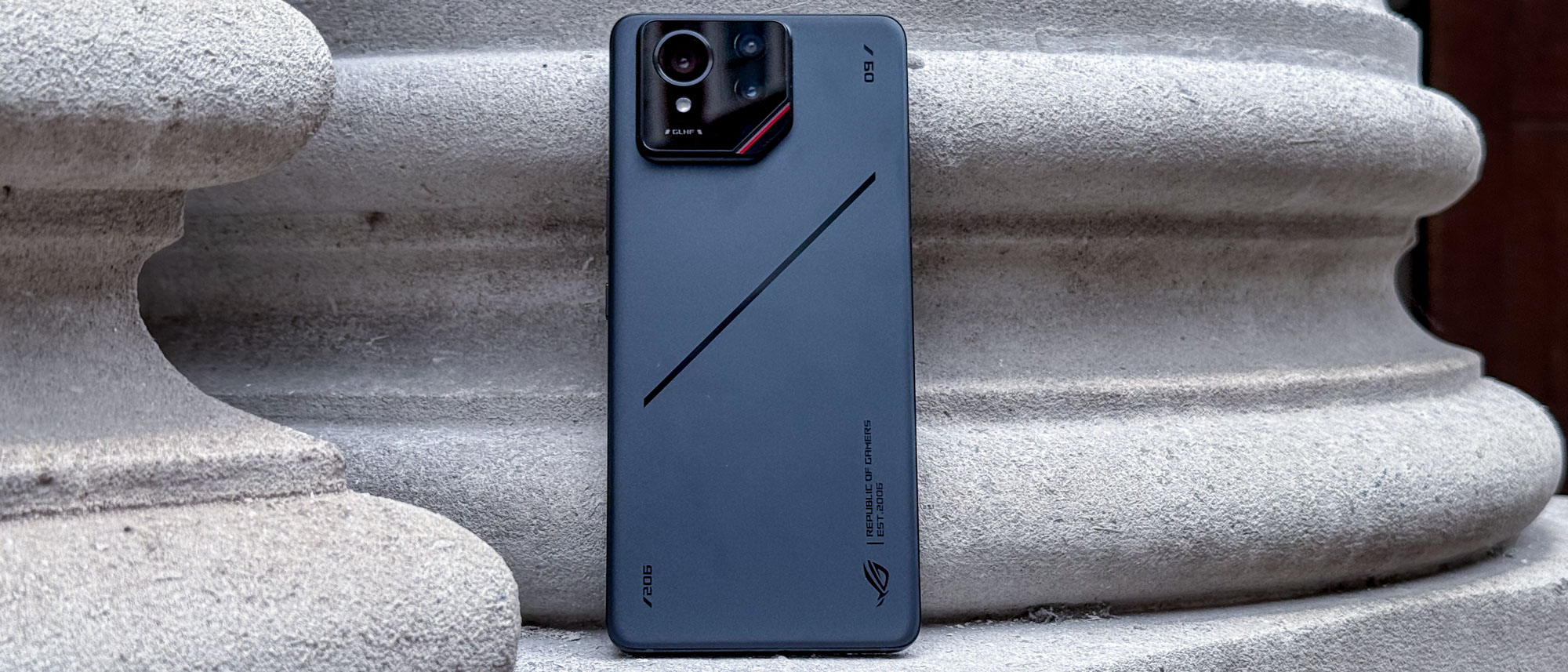Tom's Guide Verdict
A bigger battery and new chipset allows the ROG Phone 9 Pro to take the dual titles of most powerful and longest-lasting phone we've ever had the honor of testing. It's designed to be a great gaming phone, but it could make for a strong regular flagship choice (at least until more competitors with the new chip show up) if you don't mind fewer Android updates and some underwhelming cameras.
Pros
- +
The best battery life we've tested yet
- +
Superb Snapdragon 8 Elite-powered performance
- +
Plenty of gaming features
- +
Bright and colorful 185Hz display
Cons
- -
Long wait until launch for U.S.
- -
Limited software support
- -
Dull camera output
Why you can trust Tom's Guide
2025's come early as the Asus ROG Phone 9 Pro arrives on the scene with next year's tech locked and loaded. And the current best Android phones don't stand a chance.
The ROG Phone line is designed to be one of the best gaming phones around, and I can confirm that the ROG Phone 9 Pro certainly passes that test. But with its amazingly powerful new Snapdragon 8 Elite chipset and the longest-lasting battery we've ever tested, you don't need to be a regular gamer to appreciate the potential of this phone against more typical flagship phones like the Galaxy S24 Ultra (or rumored upcoming Galaxy S25 Ultra), or even the iPhone 16 Pro Max.
But for as much as I've enjoyed testing this phone's power, there are some practical limitations, including with the ROG Phone 9 Pro's photography and software, that keep this phone as a more specialized pick. The longer wait to buy this phone in the U.S. doesn't help either.
I can tell you much more about the ups and downs of the Asus ROG Phone 9 Pro experience. You just have to read on.
Asus ROG Phone 9 Pro: Specs
| Row 0 - Cell 0 | Asus ROG Phone 9 Pro |
| Display | 6.78-inch FHD AMOLED (2400 x 1080) |
| Refresh rate | 1 - 120Hz, 165Hz, 185Hz |
| Rear cameras | 50MP main, 13MP ultrawide, 32MP 3x telephoto |
| Front camera | 32MP selfie |
| Chipset | Snapdragon 8 Elite |
| RAM | 16GB, 24GB |
| Storage | 512GB, 1TB |
| OS | Android 15 |
| Battery | 5,800 mAh |
| Charging | 65W wired, 15W wireless |
| Dust/water resistance | IP68 |
| Size | 6.45 x 3.02 x 0.35 inches (163.8 x 76.8 x 8.9mm) |
| Weight | 8.0 ounces (227g) |
| Colors | Phantom Black |
Asus ROG Phone 9 Pro: Price and availability
We've yet to get official release dates for the ROG Phone 9 series around the world, with the current word only being that the phone will start shipping in "mid-December." Pre-orders are available from November 19th for anyone already sold on the phone in the U.K., but the U.S. will have to wait until January 2025 to place an order.
We're happy that Asus' prices haven't changed since the ROG Phone 8 series. The normal ROG Phone 9 Pro costs $1,199/£1,099, coming with 16GB RAM and 512GB storage. The ROG Phone 9 Pro Edition that we tested ups that to 24GB RAM/1TB storage, and bundles in an AeroActive Cooler X Pro for $1,499/£1,299.
While this review is focused on the ROG Phone 9 Pro, it's worth mentioning that there's a standard ROG Phone 9 too. This starts at $999/£949, and is almost identical to the Pro except it offers a slightly different design, a macro camera instead of a telephoto camera, and lower capacity RAM and storage.
Asus ROG Phone 9 Pro: Design
Like the ROG Phone 8 before it, the ROG Phone 9 Pro tries to hide its gaming nature from sight, using a matte finish on the glass back and aluminum sides to not draw attention to itself. There are still glossy ROG logos on the back, plus more on the side where the capacitive triggers live, and also lights built into the center of the back panel. But you won't see those unless you're up close or the lights are active.
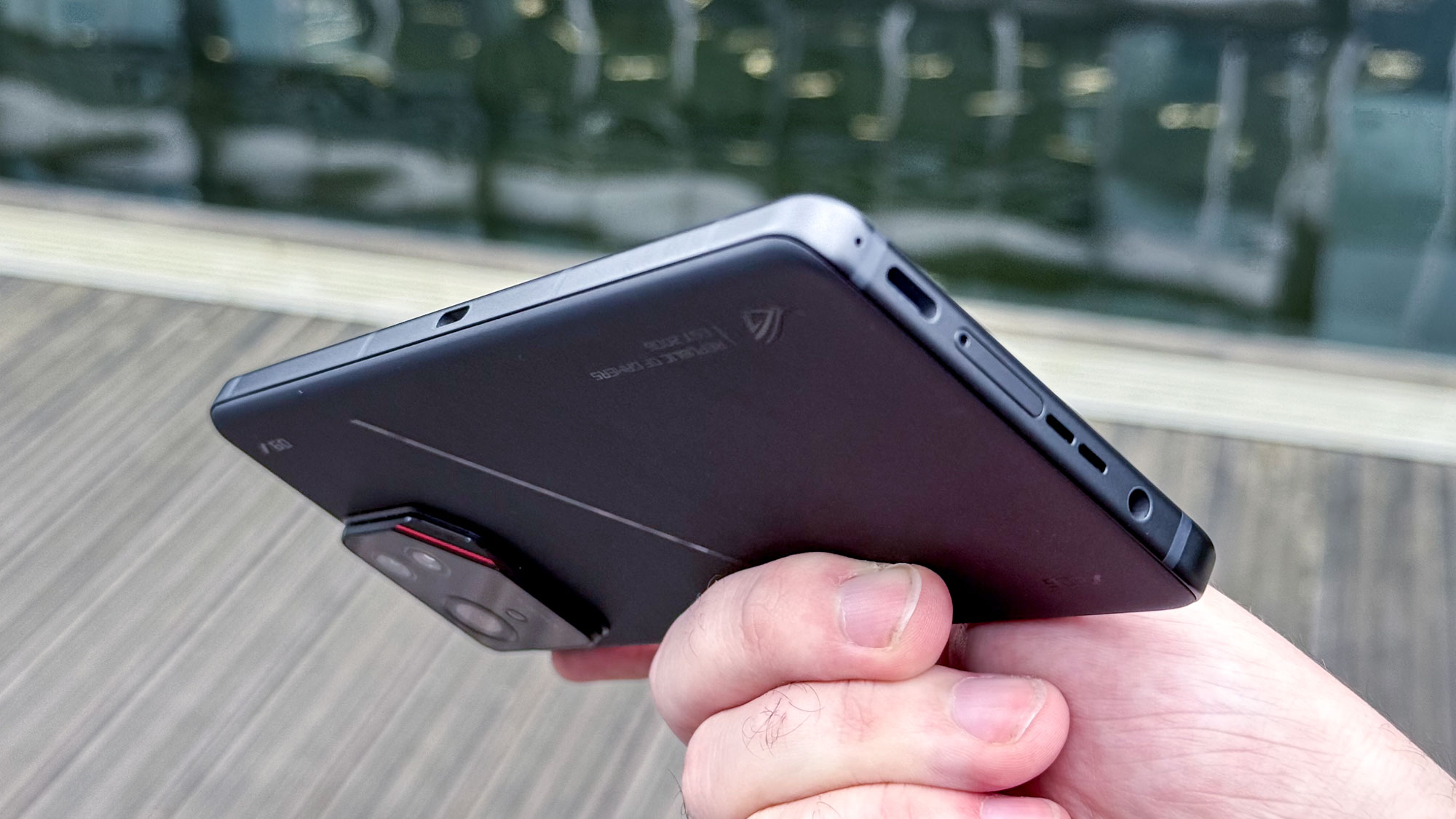
Clearer signs that this is an unusual phone are its off-center primary USB-C port on the bottom edge, a second USB-C port on the long side for easier charging while holding the phone horizontally, and a headphone jack, not often seen on phones these days. Odd, but certainly useful when you're using this phone for its intended purpose.
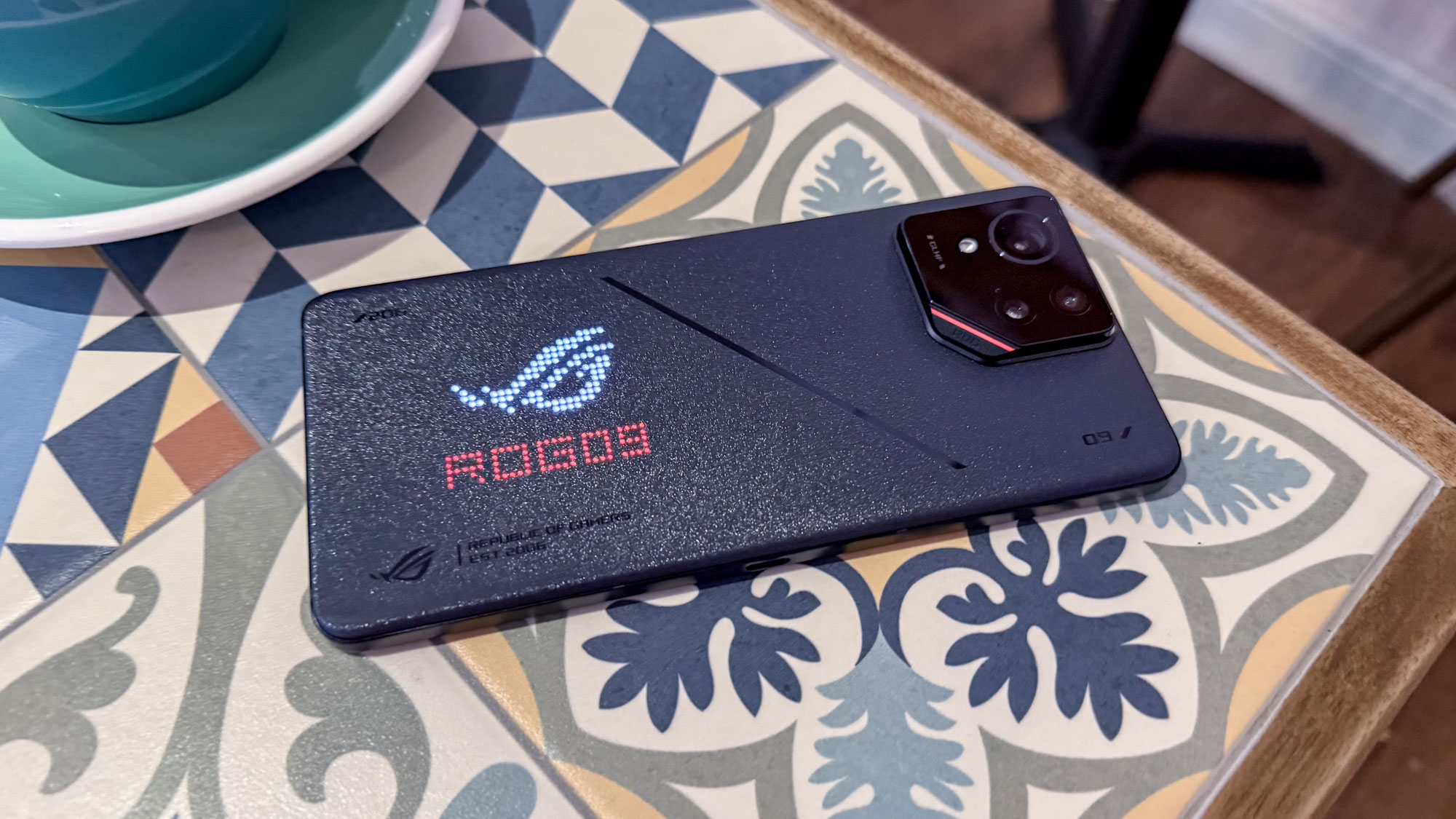
The back panel lights, or AniMe Vision in Asus' own terms, has almost doubled the number of mini-LEDs compared to the last version, and has added a red section for additional contrast. It makes the lights even more handy as a notification window, as well as a more effective way of showing off when you open up a game.
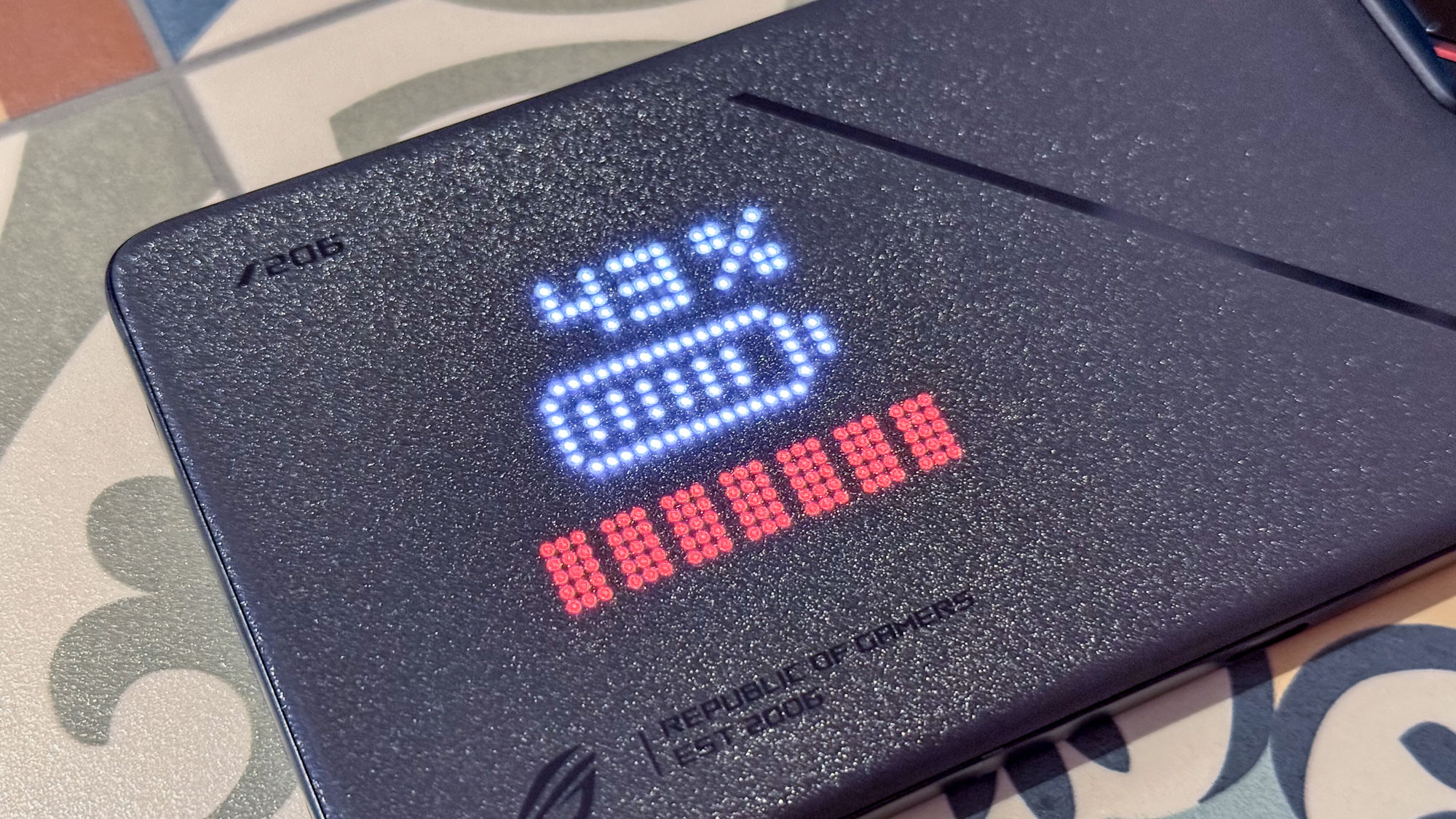
Asus is only selling the Pro version of this phone in Phantom Black (the standard edition phone offers a Storm White version too). It's a suitable color for it but having no choice at all seems odd to me.
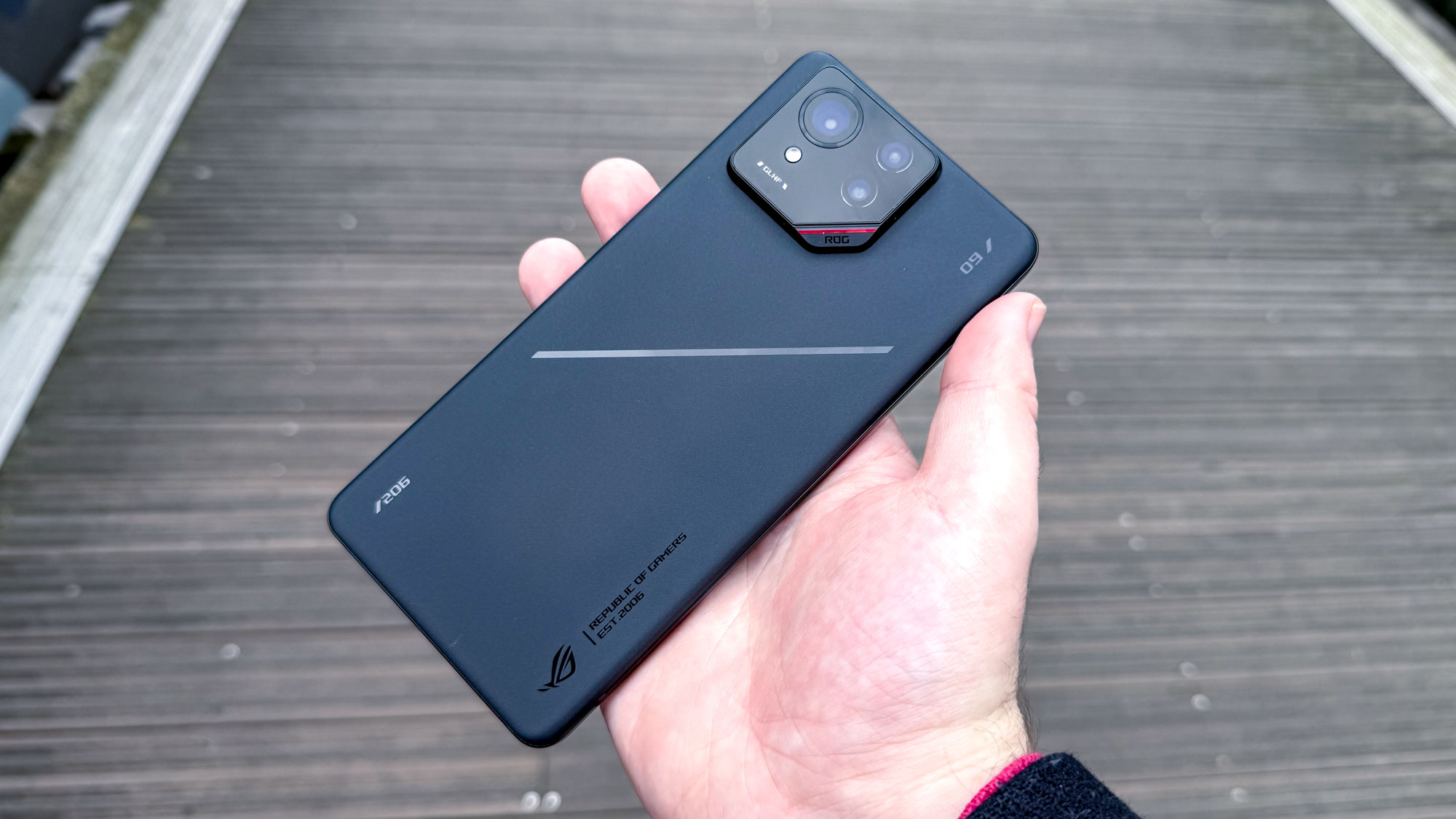
In line with other top-priced phones, the ROG Phone 9 Pro has IP68 dust and water resistance, plus Gorilla Glass Victus 2 to protect the display. Some gaming phones sacrifice durability in the name of cooling or pricing, but Asus isn't compromising here, which I certainly appreciate when taking the phone out and about.
Asus ROG Phone 9 Pro: Display
Asus is using a 6.78-inch AMOLED screen once again on the ROG Phone 9 Pro, but with one major upgrade. The display is now capable of a 185Hz peak refresh rate, with the same 1 - 120Hz adaptive and 165Hz mode beneath that as seen on the ROG Phone 8 Pro. I wasn't able to find a game that ran at 185Hz, so hopefully in the future when such titles exist, the ROG Phone 9 Pro will be ready for them.
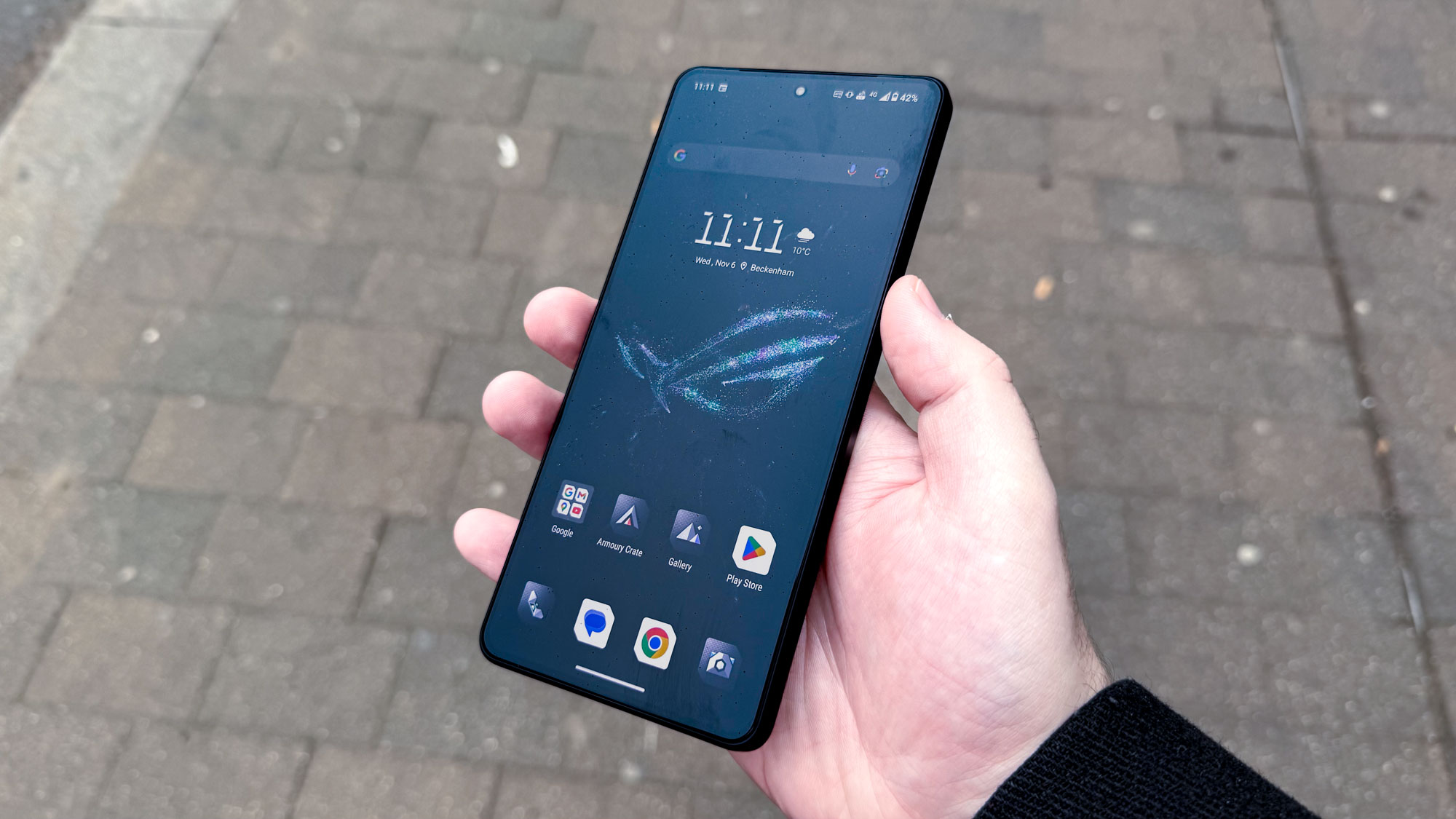
| Row 0 - Cell 0 | Asus ROG Phone 9 Pro | Samsung Galaxy S24 Ultra (Natural / Vivid mode) | Google Pixel 9 Pro XL (Adaptive / Natural mode) | iPhone 16 Pro Max |
| Peak brightness (nits) | 1676 | 1363 | 2353 | 1553 |
| DCI-P3 color gamut coverage (%) | 117.8 | 84.9 / 98.5 | 82.8/74.4 | 80.9 |
| Delta-E color accuracy (lower is better) | 0.33 | 0.23 / 0.25 | 0.24 / 0.28 | 0.26 |
What you can enjoy already is how bright this phone's display is — losing out only to the Google Pixel 9 Pro XL's intense Super Actua-powered brightness — and how colorful it is, covering much more of the color gamut than any other comparable phone. If it could rein in its color accuracy a little more, this would be a near-perfect screen.
Asus ROG Phone 9 Pro: Cameras
The ROG Phone 9 Pro's camera loadout iterates only slightly on its predecessor. It features a 50MP main camera with a refreshed sensor and enhanced gimbal stabilization, but otherwise identical 13MP ultrawide, 32MP 3x zoom and 32MP front cameras.
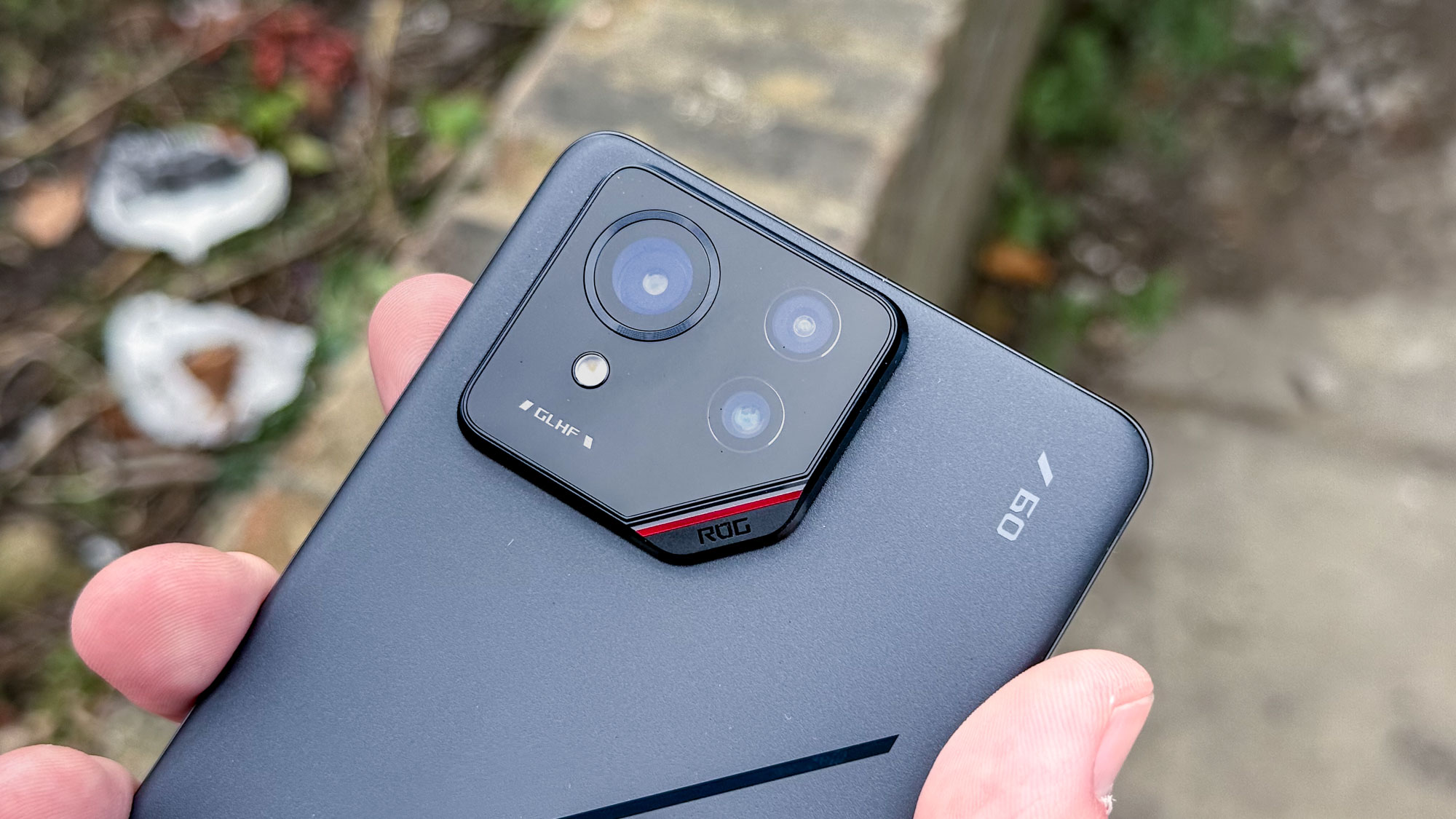
Although not its primary use, the capacitive AirTriggers on the edge of the ROG Phone can be used as a shutter button. You might accuse Asus of copying Apple's new Camera Control for the iPhone 16 series, but Asus has had shoulder buttons for a lot longer, even if they previously didn't do this.
You can't fault the detail that the ROG Phone 9 Pro's main camera provides, even up against the Galaxy S24 Ultra's 200MP sensor, in this shot of a cappuccino. But it falls down hard with its coloration, which is near lifeless compared to the bright Samsung image.
It's a similar case with this ultrawide shot of a food truck in Paddington Basin. Even the pale cream of the truck's fenders appears far richer in the Galaxy's photo.
However, Samsung's tendency to boost colors sort of backfires in this 3x zoom test. This clock on the side of a building in Beckenham looks very artificial through the lens of the Galaxy S24 Ultra, and makes the numerals and text on the clock harder to read. The washed-out colors of the ROG Phone help restore the balance between color and detail.
The last comparison we'll show you is this selfie portrait. Both phones have done a reasonable job of cutting around my glasses to apply the portrait effect, although the Samsung has created a more obvious bokeh. And, once again, the Asus lacks in the color department.
Asus ROG Phone 9 Pro: Performance
Asus is one of the lucky first phone makers to use the Snapdragon 8 Elite chipset, likely the best chip that any Android phone will get in 2025. We've seen reference devices do well on tests with the 8 Elite chip, but now it's time to see how it performs in a production model.
| Row 0 - Cell 0 | Asus ROG Phone 9 Pro | Asus ROG Phone 9 Pro (X Mode) | Samsung Galaxy S24 Ultra | iPhone 16 Pro Max |
| Geekbench 6 score (single-core / multi-core) | 2,012 / 8,076 | 3,207 / 10,227 | 2,300 / 7,249 | 3386 / 8306 |
| Wild Life Extreme Unlimited result (score / fps) | 4,406 / 26.3 | 5906 / 35.3 | 5,007 / 29.9 | 3,822 / 22.9 |
| Adobe Premiere Rush time to transcode (mins:secs) | 0:54 | Not tested | 0:42 | 0:21 |
You'll see that our test results have two sets of figures for the ROG Phone 9 Pro. The standard numbers, and those measured with the X Mode performance profile that kicks in when opening certain games and performance-heavy apps, either automatically or as you specify in the Armory Crate app.
In regular mode, the ROG Phone 9 turns in CPU results close to those of the iPhone 16 Pro Max, but beats it on graphics performance. With X Mode on, the full power of the Snapdragon 8 Elite is unleashed, allowing the ROG Phone to beat Apple and Samsung's finest with ease. That excludes the Adobe Premiere Rush test, where the competition is able to catch up with their more powerful media engines.
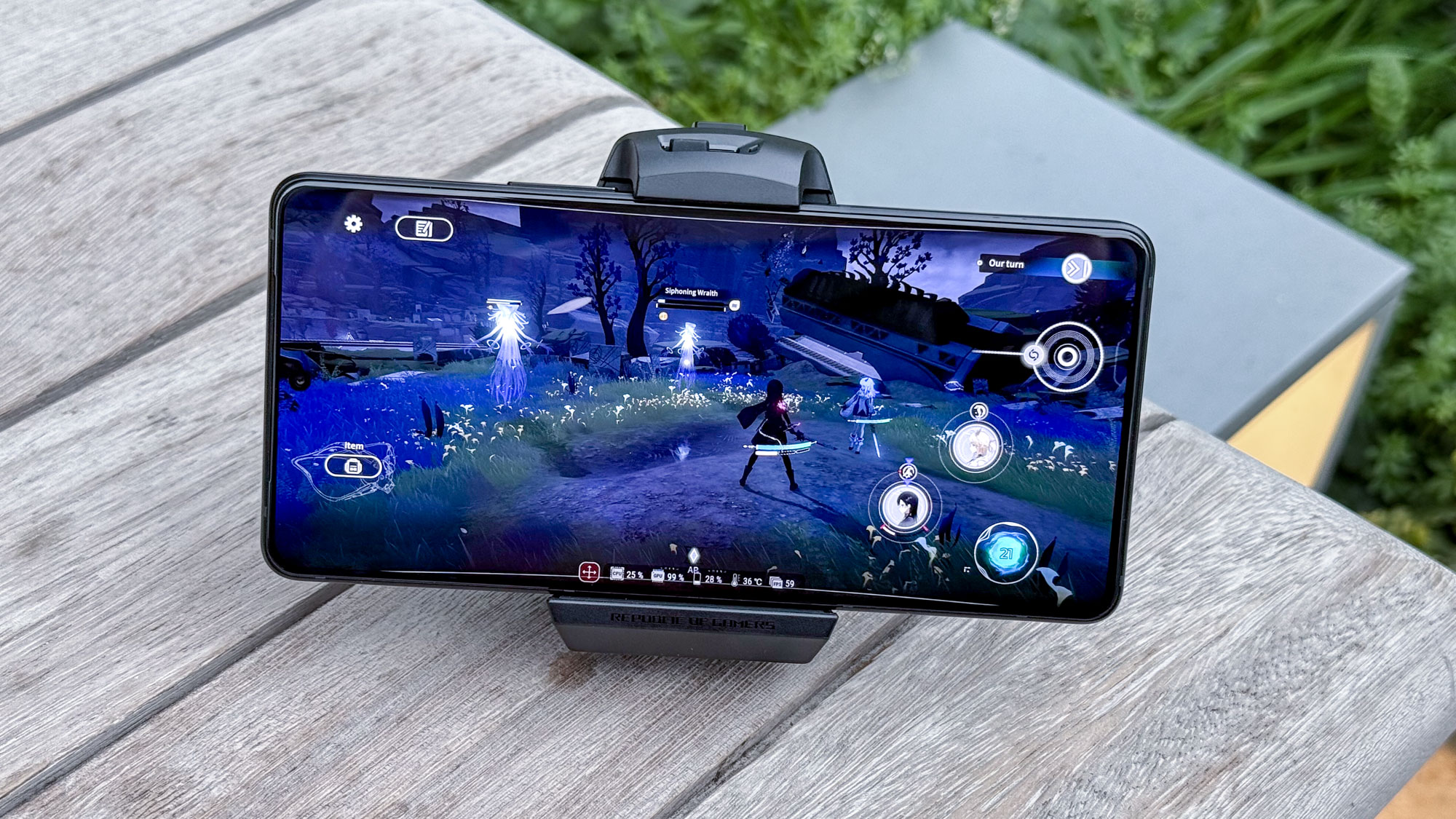
The normal ROG Phone 9 Pro gets 16GB RAM and 512GB storage. That's quite a bit of capacity considering rival phones tend to use 12GB RAM and 256GB storage as defaults. If you're willing to pay for the Pro Edition model, then you get a mighty 24GB RAM and 1TB of storage.
Asus has done some under-the-hood repositioning of the ROG Phone 9 Pro's key components in the name of cooling. The chipset is now positioned in the center of the phone, splitting the battery into two and placing them around the chip. A 57% larger graphite sheet joins the party to ensure the phone keeps cool as you play.
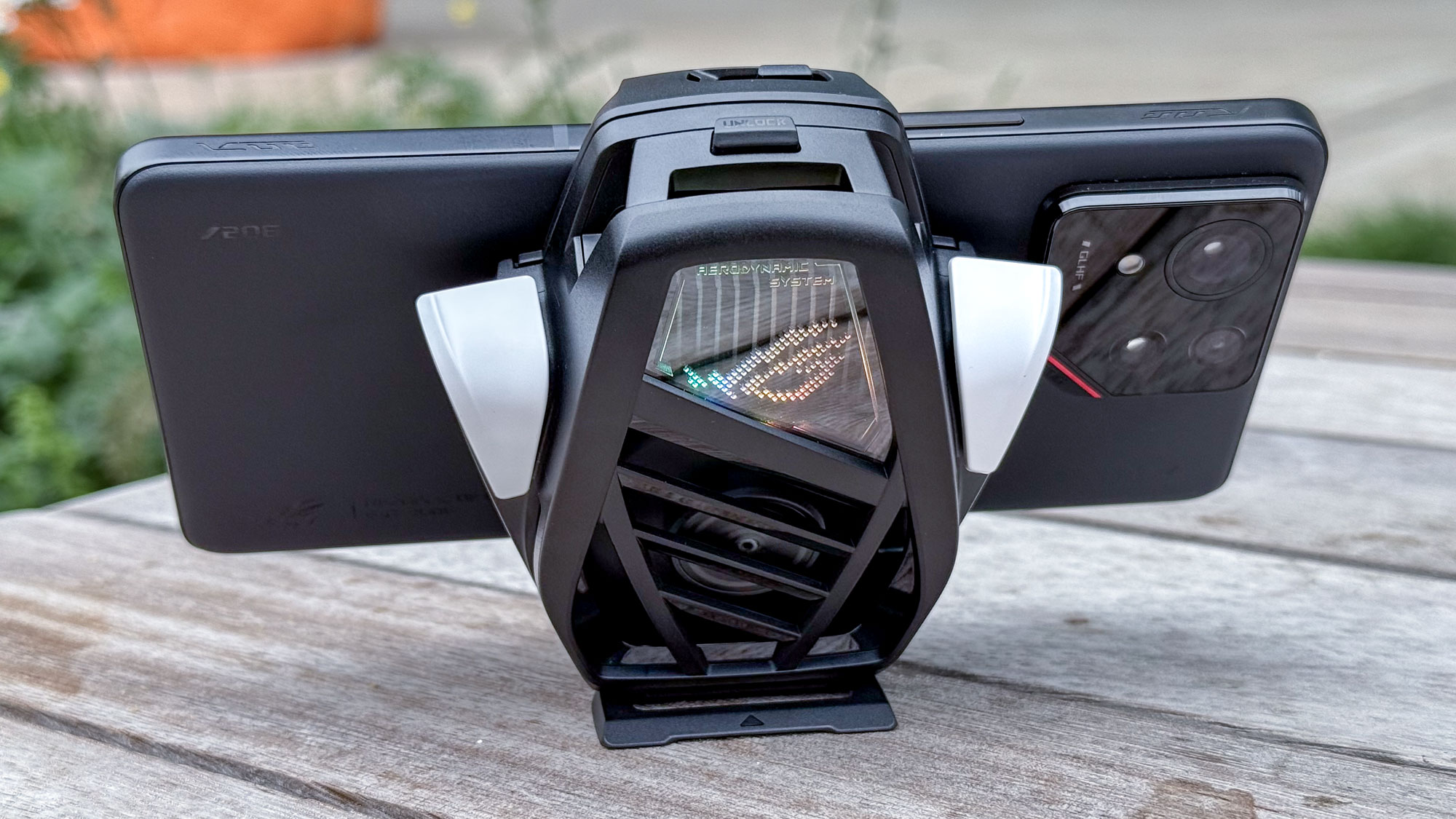
If you need heavy-duty cooling, then you can look to the new AeroActive Cooler X Pro, which comes with the Pro Edition but otherwise costs $119/£89 to buy by itself. It offers larger fan blades compared to the Cooler X from last year, but still performs the basic function of adding another two physical shoulder buttons, a subwoofer, an extra headphone jack and a kickstand, plus the all-important RGB lighting. It's also the only way to enable the ultimate performance level — X Mode Plus — effectively an overclock that should get you even better results than the already impressive X Mode.
Asus ROG Phone 9 Pro: Battery and charging
With a 5,800 mAh capacity across its two cells, the ROG Phone 9 Pro has a 300mAh increase over the ROG Phone 8 Pro from last year. The ROG Phone 8 Pro has been our best phone battery life champion since it launched, and we're happy to report the newer model has taken up that mantle.
In the TG custom battery test, where we set the phones to automatically browse the web from 100% battery to 0%, the ROG Phone 9 Pro lasted an astonishing 20 hours and 34 minutes. The next closest phone at the time of writing is the OnePlus 12R, which lasts 18 hours and 8 minutes on the same test. Between the larger battery and the improved chipset, the ROG Phone 9 Pro beats the iPhone 16 Pro Max by over three hours, and the Galaxy S24 Ultra by almost four.
| Row 0 - Cell 0 | Asus ROG Phone 9 Pro | iPhone 16 Pro Max | Samsung Galaxy S24 Ultra |
| TG battery life test time (hours:mins) | 20:34 | 17:17 | 16:45 |
Like its predecessor, the ROG Phone 9 Pro has 65W charging support, plus the option for bypass charging to stop the battery from charging (and generating heat) when you're playing games. There’s also 15W wireless charging as an option if you want to go without cables.
In testing, I charged the ROG Phone 9 Pro up to 37% in 15 minutes and to 74% in half an hour with its included charger. The Galaxy S24 Ultra isn't too far behind, reaching 71% after 30 minutes plugged into a Samsung 45W brick. The iPhone 16 Pro Max meanwhile only gets to 55% with a half-an-hour charge, using a 20W charger from Apple.
Asus ROG Phone 9 Pro: Software and special features
Although the ROG Phone 9 Pro has a very unique-looking interface, it's running Android 15 like other recent Android phones, just with an Asus Optimized skin that alters the layout of the menus slightly, and lots of custom icons and animations to sell its gamer credentials.
Asus has added a lot of features to default Android, but before we look at those, I have to point out the promised updates. The ROG Phone 9 Pro will only get two years of full Android updates, and five years of security updates. This is a big weakness, as phones of an equivalent price like the Galaxy S24 Ultra get seven years of full updates. The reasonably long window for security updates means you won't be at risk if you stick with the ROG Phone 9 Pro until 2029, but you will stop getting enhancements and new features by the end of 2026 if Asus keeps to its stated goal. Not what you want when you've spent over a grand on a new phone.
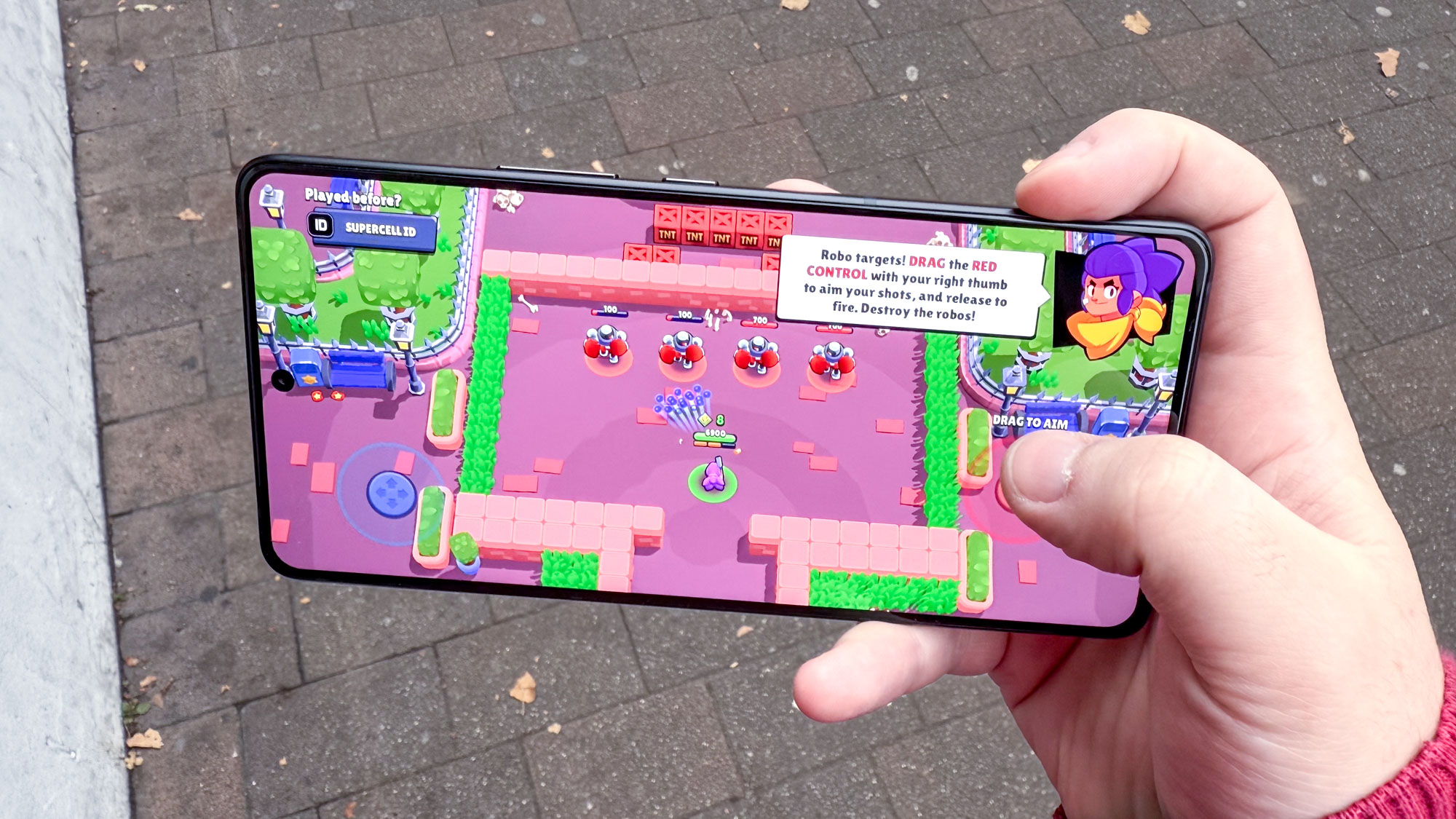
Outside of games, the ROG Phone 9 Pro uses the AI abilities first introduced on the Asus Zenfone 11 Ultra. This includes staples like AI call translation, voice note transcription, wallpaper generation, and semantic search for photos, although all of these run securely on-device. You also get Circle to Search, previously an exclusive to Samsung and Google phones, but now a standard feature for new Android flagships.
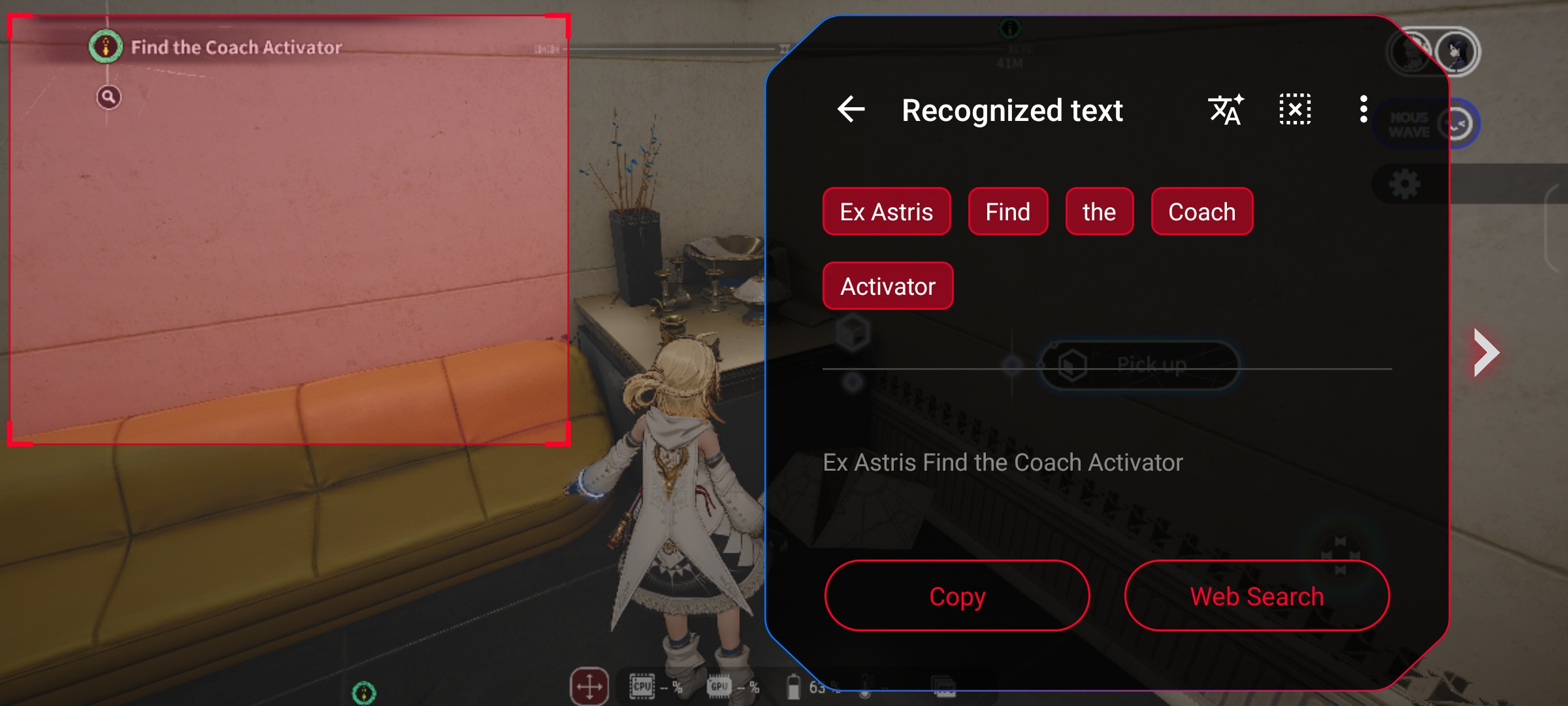
On the gaming side, there are two big new AI upgrades. X Sense AI is a versatile tool to help automate frequent in-game tasks, such as setting up auto skill upgrades for League of Legends: Wild Rift, cutscene fast-forwarding and running lock in Genshin Impact. Meanwhile X Capture detects big moments and automatically screen records for games like when you open Wishes in Genshin Impact, or big fights in Wild Rift. AI Grabber also returns from the ROG Phone 8 series, recognizing on-screen text that you can then search via an in-app browser to get hints and tips as you play.
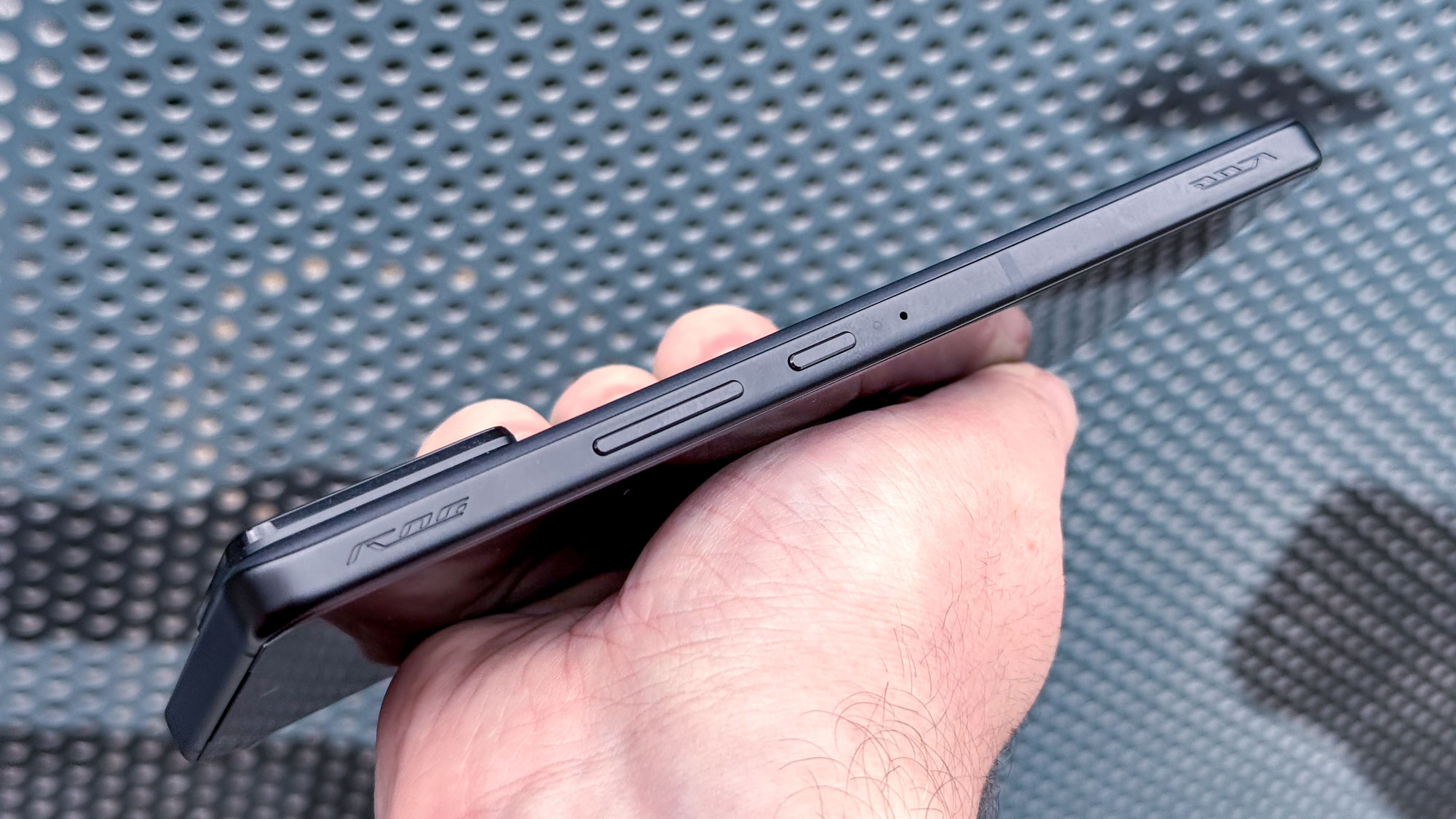
Like previous ROG Phones, you manage your games and gaming-specific settings in the Armory Crate app. It's here that you can set up the AirTriggers for each game, and manage an AeroActive Cooler if you have one.
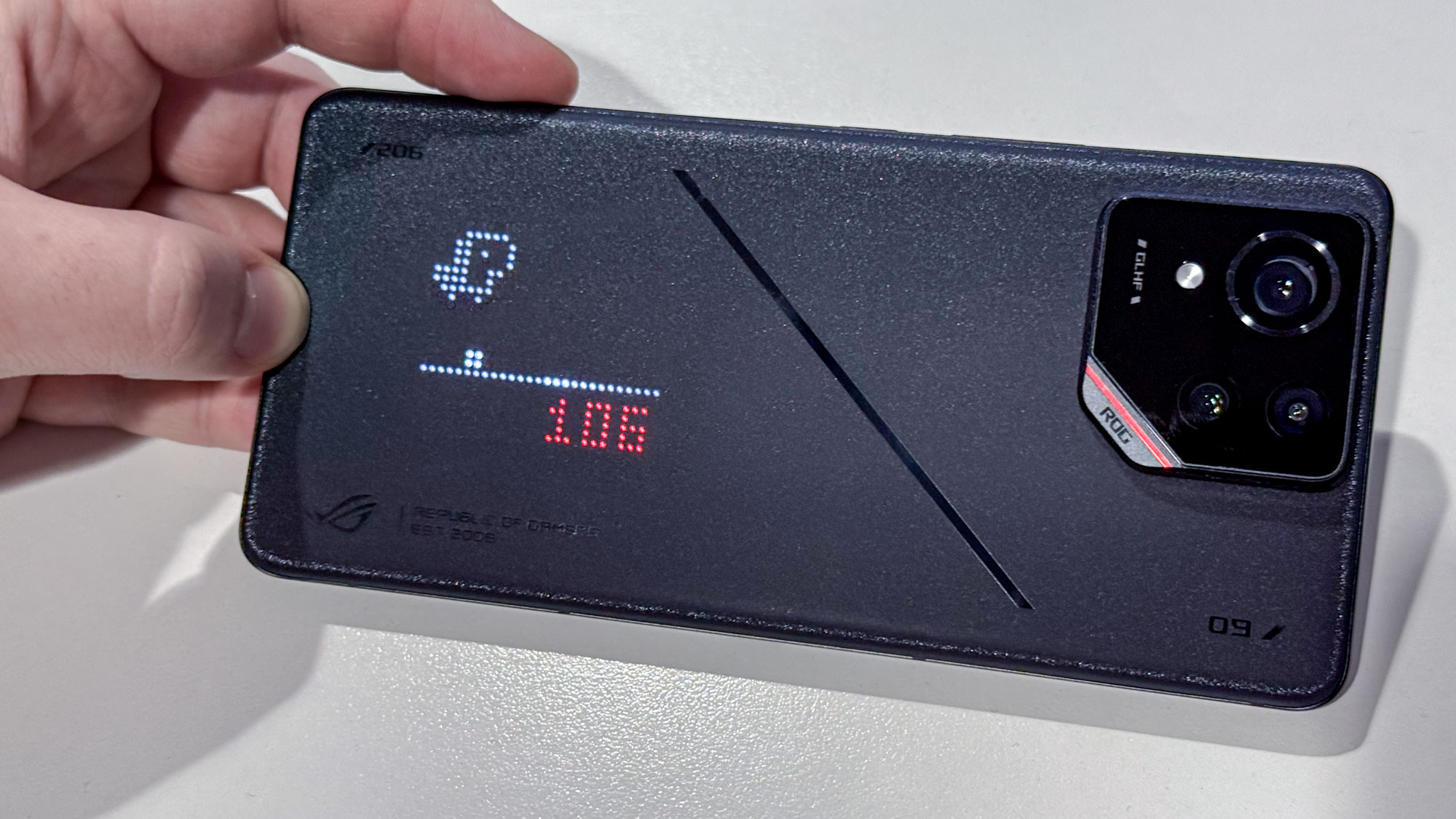
Asus has also given users the option to use the AirTriggers and AniMe Vision lights to play simple games on the back of the phone via the AniMe Play app. So if you ever get bored of playing AAA-standard games, you can instead play retro-style equivalents of Blockbuster, Snake, a classic shmup or an dino-themed endless runner game like you may have seen on a certain browser.
Asus ROG Phone 9 Pro review: Verdict
Asus has produced another amazing gaming phone that still manages to cover all the basics of a flagship phone too. But for all the ROG Phone 9 Pro's strengths, it still has the same weaknesses as before — lifeless photography, short software support, and a high price.
Fortunately for Asus, the ROG Phone 9 Pro's awesome performance, sharp looks and battery life make it easy to recommend for anyone wanting a top-flight Android phone, whether or not they're a keen mobile gamer. However, things will likely change as we go into 2025, and phones like the Galaxy S25 series and OnePlus 13 start to arrive with the same chipset, and hopefully the same power and efficiency, but with better-rounded photography and software features.
Without a doubt Asus has got the new best gaming phone on its hands with the ROG Phone 9 Pro. As for its status as a good all-round phone, it's definitely ahead there in some areas. But as more competition emerges, the ROG Phone may retreat from the center of attention in the smartphone world back to the RGB-lit battle station where it feels most at home.

Richard is based in London, covering news, reviews and how-tos for phones, tablets, gaming, and whatever else people need advice on. Following on from his MA in Magazine Journalism at the University of Sheffield, he's also written for WIRED U.K., The Register and Creative Bloq. When not at work, he's likely thinking about how to brew the perfect cup of specialty coffee.
